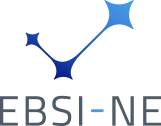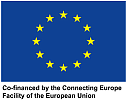COMPETENCE | SOLUTIONS | RESULT
Contacts Portfolio


Project summary.
The EBSI Node Expansion (EBSI-NE) project is a key part of Europe's digital evolution, focusing on expanding the European Blockchain Services Infrastructure (EBSI). This initiative aims to strengthen EBSI by adding 18 new validator nodes, increasing its capacity and robustness. This move is a significant step in enhancing Europe's blockchain technology, driving its adoption across the continent. EBSI-NE offers specialised support services for all stakeholders, positioning Europe as a leader in blockchain innovation and contributing to a more connected, secure, and technologically advanced digital landscape in Europe.
More information is available on the EBSI-NE website at www.ebsi-ne.com
Coordinator contact details.
MINISTERIO DE ASUNTOS ECONÓMICOS Y TRANSFORMACIÓN DIGITAL digitaleurope@es.ey.com
List of participants
Funding statement
Co-Funded by the European Union. Views and opinions expressed are however those of the author(s) only and do not necessarily reflect those of the European Union or the European Health and Digital Executive Agency (HADEA). Neither the European Union nor the granting authority can be held responsible for them.

Problem. Lithuania made some progress in the digitalization of services during the past decade. The IT sector's improvements have a prohibited satisfaction with achieved progress, but omitting the merging of new technologies, Lithuania is now facing the difficult challenges to uptake with new, recently developed technologies as fast as possible. Lithuania's participation in the Single Digital Market offers an opportunity to join EBSI – just the DLT node set up is needed. On the other hand, the DLT node set up in Lithuania will also affect the Single Digital Market as an additional EU channel for data exchange or tracing. A sufficient number of EBSI node across the EU may lead to greater standardization in use-cases: the current and to be proposed, and this may lead to better accessibility & simplicity in end-use – for citizens, businesses, or public authorities.
Opportunities. DLT node integrated with EBSI will enable interoperability among bodies in EU member state and Lithuania in the provision of trusted, secure, reliable share with information – incoming & outcoming documents’ flows, tracing and monitoring EU wide without intervening into work of the institution of other countries. Establishing a sufficient number of EBSI nodes in all EU member state will create a critical mass for efficient network operation – as much as more member state will be joined to EBSI then more use-cases & e-services will available cross-border. DLTnode will be part of EBSI & will contribute to the Europe digital services. It will be used in cross border and national use cases.
Application of Blockchain/ DLT technology is growing rapidly, including at national & EU level initiatives. Blockchain technology allows to trace regardless used technologies in other countries. DLT node provides new opportunities for new use-cases across sectors:
The Project is going to set up DLT node, integrated with European Blockchain Service Infrastructure (EBSI) and will be build capacities via training activities targeting a broader uptake of the EBSI by public services. European Commission has provided financial support from the CEF for the implementation of the project “DLTnode” (Project No 2020-LT-IA-0019, Agreement No. INEA/CEF/ICT/A2020/2287551).
The project value is 198,540 Eur, the partners' own contribution to the project is 49,635 Eur.
Duration of the project - 1 year: starting on 1st of March, 2021, the expected end of project is 1st of March, 2022
Partners. The project “DLTnode” is being implemented by Association Infobalt (Coordinator) together with partners – Public institution eDelivery LT, Systems integration solutions, UAB, UAB Skaitos kompiuterių servisas and UAB Ekonominės konsultacijos ir tyrimai”
The objective is to set up of Distributed Ledger Technology (DLT) node, to test & validate it, integrate with European Blockchain Service Infrastructure (EBSI) and build capacities in public sector. The deployed node will be tested and validated including its integration with EBSI, a review of conformity to security, data protection and eIDAS requirements will be conducted over the node, which will be piloted for at least 6 months. Two training programmes for use cases users and technicians will be built and training activities will be delivered in order to facilitate the EBSI adoption in Lithuania. Communication and dissemination activities will also be implemented to increase awareness of the availability of the DLT node, and to share and exchange best practices.
The benefits. As a result of Action, the roll out of the EBSI will be supported in Lithuania, allowing delivery of cross-border public services based on the blockchain technology and enhancing the way citizens, government and businesses interact.
The sole responsibility of this publication lies with the author. The European Union is not responsible for any use that may be made of the information contained therein.




On 8 June 2011, the European Parliament approved Directive 2001/83 / EC, stating that falsified medicinal products pose a significant risk to the public health sector (point 7 of 2001/83 / EC). This Directive incorporated the requirements which led to the follow of Regulation (EU) 2016/161 of 2 October 2015, which detailed and extended the technical requirements for systems to control falsified medicinal products. Under this regulation, with a few exceptions, wholesale distributors and pharmacies in all Member States are required to ensure the control of falsifications from 9 February 2019.
Wholesalers, who receive medications and pharmacies, hospitals and other health care facilities will be responsible for checking them. They will need to make sure that the medicines are registered in the data warehouse and that they are decommissioned when they are sold to ensure that the products are not resold.
Changes in drug status may include dispensing of drug packages, locking packages for further investigation, destruction of packages, recording of theft and export of packages to third countries. The National Verification System Data Warehouse can provide packaging designs as samples, including free samples.
In accordance with Directive, SKS as an IT company with more than 20 years of experience in the pharmaceutical market, offers IT solutions to help pharmaceutical companies implement FMD smoothly.
If required, the data of the drug counterfeiting system can be collected and integrated with the systems used by the clients.
SKS - Certified IT service provider for Falsified Medicines Directive (FMD)
Skaitos kompiuterių servisas UAB
K.Petrausko g. 19A, Kaunas
+370 37 330220
Contacts:
Jonas Žalinkevičius | +370 655 09449 | jonas@vaistai.lt
Marius Leicmonas | +370 650 93764 | marius@vaistai.lt

In close cooperation with UAB "Registrų centras" supported by the developers of the eSąskaita, we together with UAB "Sistemų integracijos sprendimai" have developed a fully automated solution for the delivery of eSąskaita to companies selling goods and services to the public sector.
Our customers will now automatically and directly submit their invoices to the system esaskaita.eu. Documents are processed without any additional actions or functional buttons being pressed.
The solution works smoothly and has already received a favorable customer assessment.
With the successful use of the solutions offered by "Skaitos Kompiuterių Servisas", it already offers its customers not only a simple, but also a secure way to submit electronic invoices to their partner companies.
Even more, from now on, employees of the company can automatically login to the https://market.vaistai.lt account of the "Skaitos Kompiuterių Servisas" system, which both them and the company's customers are comfortable to view the status and status of their invoices in the general e-mail system.
We look forward to offering not only automated invoicing delivery systems for suppliers in the future, but also the convenience of contracting companies to automatically import invoices from esaskaita.eu into their accounting systems.
Problem. By 2017, Lithuania was one of the few EU members states in 2017 without an access to the EU platform for basic services in the EU's single digital services infrastructure, thus being an exclusion of cross-border digital services.
Meanwhile, Lithuanian business with the institutions, economic entities and citizens of the EU is changing daily in large volumes of documents, but practically does not have the ability to send and receive these electronic documents in an interactive, secure, reliable and legally recognized way. Such a cross-border exchange of electronic documents is facilitated by the electronic delivery of digital services block (building blocks).
Opportunities. The EU encourages the EU Member States to engage in the development and use of cross-border digital services, providing Member States with access to EU trans-European networks and providing financial support for the development of such services through projects of common interest. The Connecting Europe Facility (CEF) is the main instrument for providing EU financial support for trans-European networks and building blocks for building digital services hereinafter "digital service blocks"), such as electronic delivery eDelivery, eInvoicing, eID, eSignature, eHealth, eTranslation.
The Project. Seeking to set up eDelivery in Lithuania the European Commission has provided financial support from the CEF for the implementation of the project eDeliveryLT (Project No 2016-LT-IA-0080, Contract No. INEA / CEF / ICT / A2016 / 1284783).
The project value is 248.810 Eur, the partners' own contribution to the project is 62.202,5 Eur.
Duration of the project - 2 years: starting on 2017-04-01, the expected end of project is 2019-04-01, the beginning of the electronic delivery service is scheduled to be 09/01/2018.
Partners The project eDeliveryLT is being implemented by Infobalt (Coordinator) together with partners - UAB Sistemų integracijos sprendimai, UAB Skaitos kompiuterių servisas and Public institution eDeliveryLT. The latter is responsible for the further support and development of electronic delivery.
The goal of the project is to create an Access Point with Service Metadata Publisher (SMP) for cross-border exchange of electronic documents and to test the operation of this access point for one year. This will enable the Lithuanian business entities to exchange electronic documents both at the same time and at EU level.
For eDelivery, eDelivery LT intends to use the B2A (Business Institutions) script, approved by the PEPPOL organization and compatible with the B2B (business-to-business) script. Compliance with the requirements for electronic identification and electronic transactions ensures legal certainty and reliability in cross-border transmission of electronic documents, while the interface with the Digital Service Infrastructure (DSI) ensures secure and convenient document transac- tions.
The money Electronic delivery will enable interoperability at EU level and among EU Member States, regardless of which standards are used in each EU country.
In addition, by creating electronic delivery in Lithuania, as one of the countries of the EU Common Market and the Schengen area, it can be expanded beyond the EU, in particular in the EU Eastern Partnership countries, from where large flows of transport, goods and services come.

Only the author is responsible for this publication. The European Union is not responsible for the use of any information contained therein.
Skaitos kompiuterių servisas UAB
K.Petrausko 19A, Kaunas, LT-44162 Lithuania
phone: +370 37 330 220
SKS IT phone: +370 37 323 201
e-mail: info@vaistai.lt